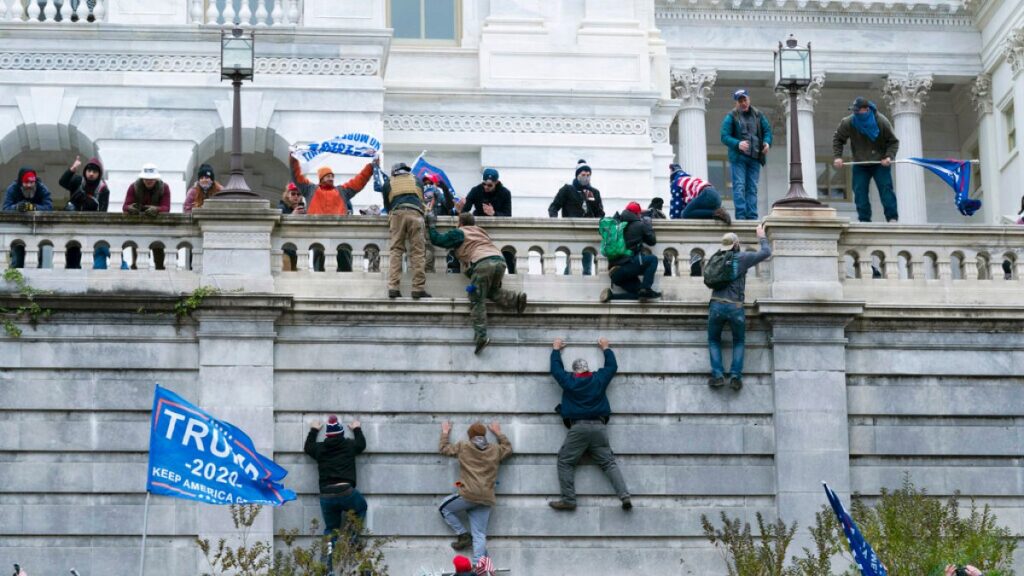
As President-elect Donald Trump prepares to return to the White House, his proposals on issues such as immigration, taxes, and trade have sparked furious discussion.
But two weeks away from returning to one of the world’s most powerful political offices, Trump remains animated by past grievances, laying out a plan of attack against political rivals, critics and a loss in the 2020 election that he has never accepted.
Much of his rhetoric has focused on the events of January 6, 2021, when a mob of his supporters stormed the US Capitol in an effort disrupt the certification of the election results. Monday marks the fourth anniversary of that riot.
Speaking to a crowd of supporters on December 22, Trump took time during his remarks to rail against the January 6 Committee, a Congressional panel that probed Trump’s efforts before, during and after the riot.
“The unselect committee of political thugs, J6 committee, what they did is so illegal,” he told the audience.
But Trump’s focus on January 6 is not limited to his critics. He has also pledged to offer a full pardon for rioters who took part in the violent attack on the Capitol, an event that many of his critics describe as an insurrection.
Advertisement
What was January 6, how many people have been charged in relation to the riot, and how could Trump use his presidential powers to release those convicted from prison? We tackle these questions and more in this brief explainer.
What was January 6?
Following his loss to Joe Biden in the 2020 election, Trump forcefully promoted the false claim that the election had been “rigged” and stolen from him through massive fraud.
That effort went beyond rhetoric, and included a scheme to replace officials who cast ballots in the Electoral College based on the popular vote in their respective states with a separate batch of pro-Trump electors.
On January 6, 2021, Trump held a rally in the capital of Washington, DC, where he railed against the election results and urged his supporters to “fight like hell”.
“When you catch somebody in a fraud, you’re allowed to go by very different rules,” he said.
Trump ended the speech by urging his followers to march to the Capitol building to “peacefully and patriotically make your voices heard” as Congress met to certify the election results.
For the next several hours, a mob of Trump’s supporters, some of them armed, assaulted police trying to hold back the crowd and stormed the building in an effort to stop Trump’s loss from being certified.
One of the rioters, Ashli Babbitt, was shot and killed by a police officer as she tried to breach the House chamber.
How many people have been charged in connection to the riot?
According to the US Department of Justice (DOJ), more than 1,488 people had faced criminal charges in connection to the attack on the Capitol as of August 6, 2024, the latest available data.
Advertisement
Those figures included people from all 50 states and the capital of Washington, DC. About 547 defendants had been charged with assaulting, resisting, or impeding officers or employees, including 163 people who were charged with assault with a deadly weapon.
What has Trump said about the participants?
Trump has characterised those charged and imprisoned for their actions on January 6 as victims of political persecution, calling them “patriots” and “political prisoners” and promising to use the powers of presidential pardon to release them from prison when he returns to the White House.
In a social media post in March, Trump said one of his first acts as president would be to “Free the January 6 Hostages being wrongfully imprisoned!”
What has Trump said about politicians critical of his role on January 6?
Trump has taken a much less lenient approach towards political rivals who have overseen efforts to bring attention to his efforts to overturn the 2020 election and criticised his actions on January 6.
In July, Trump shared a post on his social media website Truth Social saying that former Republican Representative Liz Cheney, one of two Republican members of a US House of Representatives probe into January 6 and Trump’s efforts to overturn the election, should face “televised military tribunals” for acts of “treason”.
In another post, Trump shared an image of 15 lawmakers, including members of the January 6 probe, and said that they “should be going to jail” instead of former Trump strategist Steve Bannon, who served a four-month prison sentence in 2024 for defying a subpoena in the congressional investigation into January 6.
Advertisement
What do Americans think about the events of January 6?
A December 2023 Washington Post-University of Maryland poll found that about 55 percent of US adults believe that January 6 was an assault on US democracy that should “not be forgotten”.
But Republican voters are much less likely to agree with that sentiment, and more than two-thirds continue to believe that Biden’s election in 2020 was illegitimate, according to polls. Republicans are also more likely to say that Trump was not responsible for the violence that occurred on January 6, with just 14 percent holding him responsible compared with 53 percent of US adults.
Why is this important?
While the majority of people in the US continue to view January 6 and Trump’s role in the events of that day unfavourably, those negative feelings did not prevent him from beating Democratic rival Kamala Harris in the 2024 election.
Now, as Trump prepares to return to the White House, some see Trump’s continued insistence that he was the true winner of the 2020 election and his stated desire to prosecute his political rivals as evidence that he will pursue a more vindictive and antidemocratic agenda than during his first term in office.











More Stories
Sense of impunity ‘absolute’: The NGO holding Israeli soldiers to account
Israeli soldiers hide in white van to arrest Palestinian man
England captain Buttler should be spared Afghanistan boycott decision